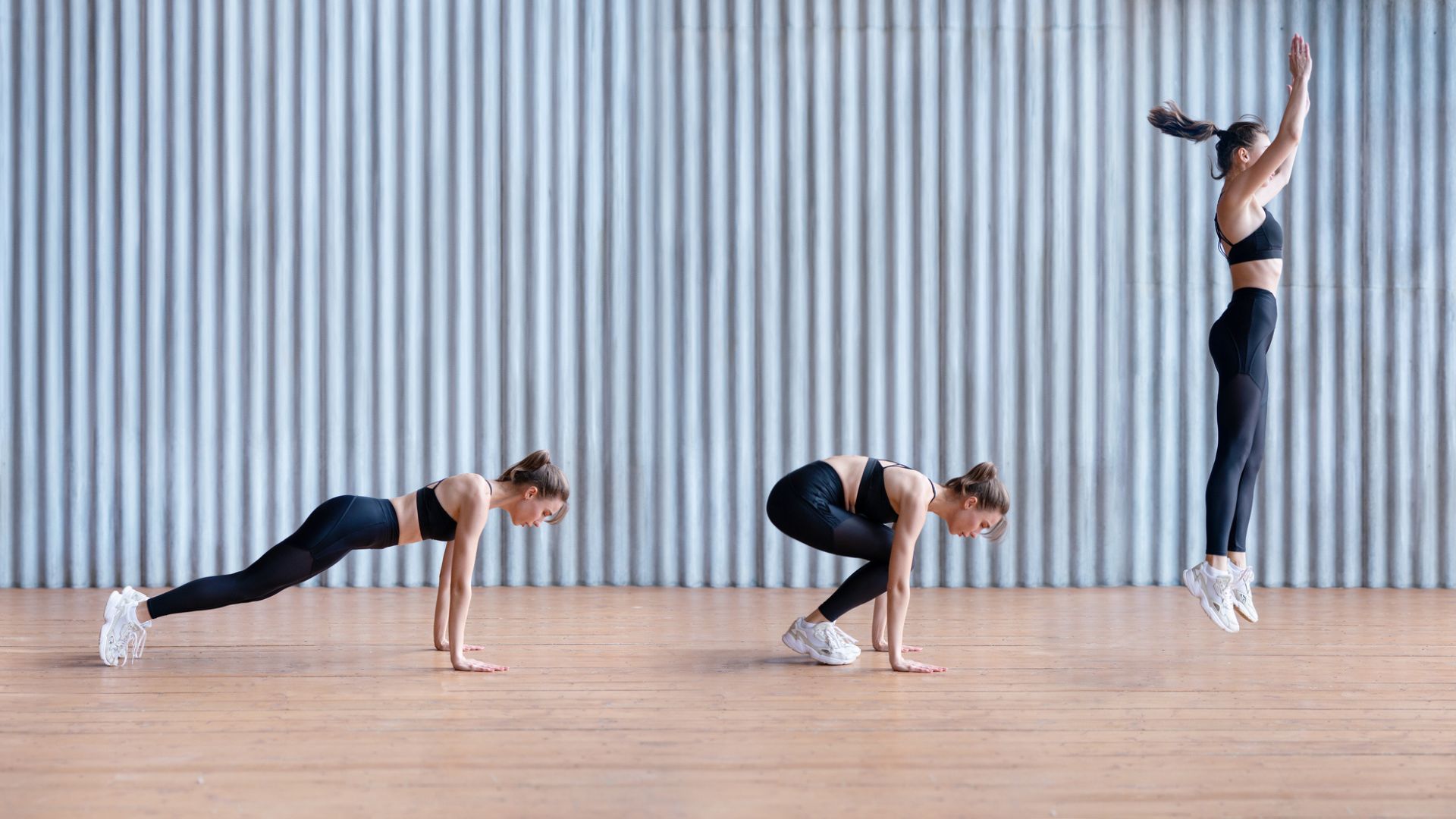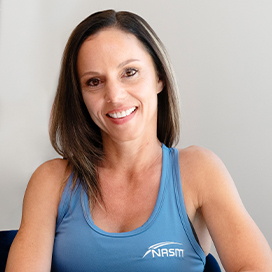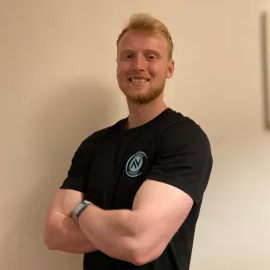A trainer says these five moves are better than burpees for most people
If you don’t like burpees, an exercise expert says there are plenty of great alternatives for achieving similar results


Burpees might just be the most loathed exercise in the world, but I have some good news. An exercise expert says that, if you don’t like them, you don’t have to do them.
"Are there any moves you prefer to burpees or might suggest as an alternative?" I asked Wendy Batts, a master instructor at NASM and assistant professor in exercise science at PennWest California.
"Harry, how much time do you have?" she replied.

Wendy Batts is an assistant professor in exercise science at PennWest California and a master instructor at the National Academy of Sports Medicine (NASM). She has more than 25 years' experience in the fitness industry and holds a master's degree in exercise science and health promotion.
Alternatives to burpees
Batts refers to burpees as a "metabolic blast" because the move recruits multiple major muscles and raises your heart rate, delivering elevated calorie burn and cardio perks. But burpees aren’t the only way to achieve this. Here are five alternative moves that have similar benefits.
1. Prisoner squat to calf raise
- Stand with your feet hip-width apart, your toes facing forward and your hands on the back of your head.
- Push your hips back to initiate the movement then bend your knees to lower your hips as far as you can control. As you do this, keep your back straight and your chest up.
- Drive through your heels to return to the standing position. At the top of the movement, lift your heels off the floor to raise your calves.
Benefits
This equipment-free exercise recruits several big leg muscles says Batts, so it can significantly increase your heart rate and boost your calorie burn. It also strengthens your lower-body muscles and joints.
"The muscles you’re focusing on are your quads and glutes [the muscles on the front of your thighs and buttocks, respectively]. Then by coming on to your toes, that’s more joints and more muscles that are being worked," she explains.
Start your week with achievable workout ideas, health tips and wellbeing advice in your inbox.
2. Multiplanar lunge
- Stand upright with your feet hip-width apart and your toes facing forward.
- Keeping your back flat and your torso upright, step forward with your right foot and lower your left knee so it’s just above the floor. Both knees should form rough right angles.
- Drive through your right foot to return to the starting position.
- Next, step out to your side with your right foot. Keep your left leg straight, your chest up and your toes facing forward. Bend your right knee to lower your hips as far toward the ground as you can control.
- Drive through your right foot to return to the starting position.
- From here, rotate your whole body to the right. As you do this, step forward with your right foot to perform a lunge.
- Drive through your right foot to push yourself back to the starting position, rotating as you do so you end up facing the same way you were when you started the movement.
- Repeat this on the other side of your body.
Benefits
"I’m a huge fan of multiplanar lunges," says Batts. "Again, they are going to increase your heart rate if you speed them up.
"They also work all three planes of motion. There are regular lunges in the sagittal plane, lunges in the frontal plane where you’re stepping out to the side, and the transverse plane where you turn and lunge.
"This is mimicking things you do in everyday life like picking things up off the ground, and it can increase your heart rate while building functional strength."
3. Mountain climber
- Come into a high plank position with your weight spread between your hands and your toes. Your body should form a line from your head to your heels, your feet should be pointing straight and you should be looking at the ground.
- Holding this balanced position, bring your right knee towards your chest as far as you can control.
- Step your right foot back to the starting position, then repeat with your left knee.
- Slowly increase the speed until you are running on the spot. Maintain a flat back and avoid lifting your hips into the air
Benefits
Batts says if you want to do something similar to burpees, you should master the mountain climber. Just make sure you can hold a plank first, as a mountain climber is really just a moving plank.
"You want to make sure you feel comfortable with the move; that you can maintain good stability and control of your whole body while you’re in a face-down position.
"At that point, you just run in place. You don’t need any equipment, you’re only using your bodyweight, but then you’re raising your heart rate while doing it.
"You can do it for a time that makes sense for you. Don’t start with a minute, start with 20 seconds, then 30 seconds, and increase it that way."
4. High knees
- Stand upright with your feet hip-width apart and your toes facing forward.
- Bring your right knee up so your thigh is parallel to the ground, then lower your right foot to the floor.
- As you do this, explosively bring your left knee up so your thigh is parallel to the ground.
- Continue this, gradually aiming to increase the pace until you are running on the spot.
Benefits
Batts describes this as a dynamic exercise, which means that it puts your muscles and joints through a good range of motion while raising your heart rate.
"Make sure you have good control of your body, good ankle mobility and good core stability first because you don’t want to be hunched over while you’re doing it. You also want to have good flexibility to get your knees up, and make sure you’re not landing with your feet turned out," she says.
"When you can do all this, start small, whether you’re doing it for time or reps, then gradually move faster or do more over time."
5. Plank walks
- Start in a high plank position, with your weight spread between your hands and your toes, your hands roughly beneath your shoulders and your body forming a straight line from your head to your heels.
- Lower yourself down onto your forearms, one arm at a time, so you come into a low plank position.
- Push yourself back up to the high plank position.
Benefits
"If somebody can do a plank, and do it well, I always recommend plank walks," says Batts.
"It’s going to strengthen your chest, arms and core, and if you do them faster it will raise your heart rate too.
"Exercises that don’t involve movement of the spine are going to work your core stability, which is what you need to protect the spine. You’re focusing on the little muscles that make up what they call intervertebral stability. You want to lock that down first before you get into more advanced motions and movements.”
Why do people hate burpees?
Batts believes the burpee is a deceptively difficult exercise, despite featuring heavily in beginner bodyweight workouts.
"People hate them because they don't do anything to work themselves up to a burpee," she explains. "They go from nothing to a burpee, and then it’s a hot mess."
If you want to add burpees to your workouts, she recommends building the necessary strength for performing each part of the exercise correctly.
"In reality, people are struggling to do a plank or some of the foundational exercises that you want to do well before moving on to something as advanced as a burpee."
The exercises above can help you build the strength and cardiovascular fitness necessary for a perfect burpee.

Harry Bullmore is a Fitness Writer for Fit&Well and its sister site Coach, covering accessible home workouts, strength training session, and yoga routines. He joined the team from Hearst, where he reviewed products for Men's Health, Women's Health, and Runner's World. He is passionate about the physical and mental benefits of exercise, and splits his time between weightlifting, CrossFit, and gymnastics, which he does to build strength, boost his wellbeing, and have fun.
Harry is a NCTJ-qualified journalist, and has written for Vice, Learning Disability Today, and The Argus, where he was a crime, politics, and sports reporter for several UK regional and national newspapers.



